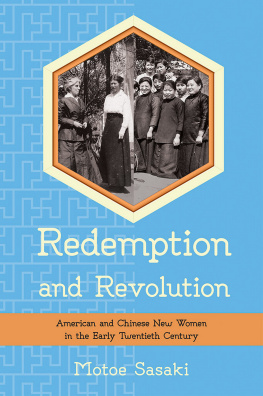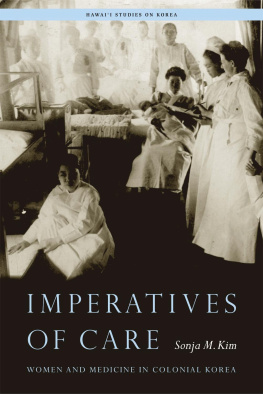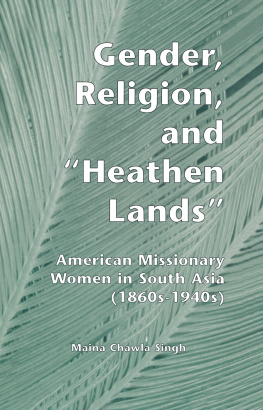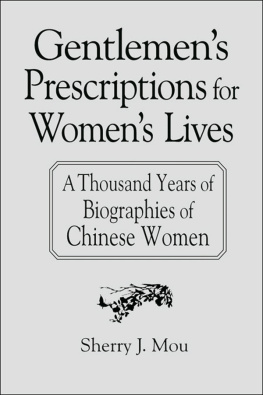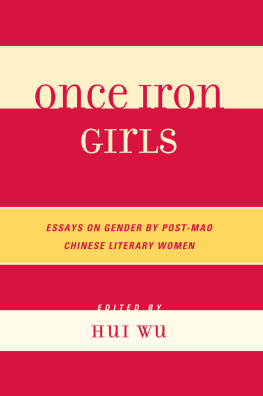Writing a book is often compared to a journey. The life of this book, from inception to completion, has very much been a kind of journey for me. Over the course of writing, I have lived in four different countries and have incurred tremendous debt to a wide variety of individuals and institutions. I began this project in the history department of the Johns Hopkins University. From the initial stages of this project until its completion, Dorothy Ross and Paul Kramer offered me insightful guidance and advice. Without their long-standing support and encouragement, this book would not have been possible. I am also greatly indebted to Judith Walkowitz and Tobie Meyer-Fong, who not only generously offered valuable scholarly comments and suggestions but also inspired me to become a female, professional academic.
I feel fortunate to have been affiliated with the gender studies division at the Australian National University when I was writing this book, and I am particularly grateful to Tamara Jacka, Margaret Jolly, and Rosanne Kennedy for their many stimulating ideas and suggestions. I also had the privilege of spending time with China scholars at Leiden University in the Netherlands. I am especially grateful to Francesca Del Lago for her confidence in the potential of this book project.
Like all historians, I received kind support and assistance from librarians and archivists. This book has been made possible by the helpful staff and access to archival records at the Yale Divinity School Library, the Rockefeller Archives Center, the World YWCA Archives in Geneva, the YWCA of the U.S.A., the Presbyterian Historical Society Archives, the Burke Library of Union Theological Seminary, the Yale University Sterling Memorial Library, the Sophia Smith Collection at Smith College, the Wellesley College Archives, the Schlesinger Library at the Radcliffe Institute for Advanced Study, the Rare Books and Manuscripts Division at the New York Public Library, and the Cornell Medical Center Archives. I am also indebted to the anonymous readers of Cornell University Press for their helpful comments and suggestions. I thank Michael McGandy, who guided me patiently through the publishing process.
I must also thank the following friends at Osaka University, the Johns Hopkins University, the Australian National University, and Leiden University for their support: Tim Amos, Anna Beerens, Mary Kilcline-Cody, Amy Feng, Guo Hui, Guo Jie, Kyoko Matsukawa, Hiroko Matsuda, Kyoung-hee Moon, Bradley and Camelia Naranch, Saeyoung Park, Sachiko Tanuma, Lucy Tatman, and Vanessa Ward. I also thank Kei Tanaka, Mari Yoshihara, Junji Koizumi, Satoshi Nakagawa, Naoki Kasuga, and my current colleagues at Hosei University in Tokyo.
My parents and sister, Toshihide, Mutsuko, and Kaori Sasaki, and my in-laws, the late Edwin Gayle and Emily Gayle, deserve special thanks for their moral support. My last, and greatest, debt of gratitude is to my husband, Curtis Anderson Gayle, who continuously encourages and supports me with his great wit and humor.
Primary Sources
Manuscripts
Burke Library, Union Theological Seminary, New York
Matilda Calder Thurston Papers
The Missionary Research Library Special Collection and Archives
Medical Center Archives of New York-Presbyterian/Weill Cornell Medical Center, New York
Anna D. Wolf Interview Records
New York Public Library, Rare Books and Manuscripts Division, New York
Maud Russell Papers
Presbyterian Historical Society Archives, Philadelphia
Hackett Medical College
Rockefeller Archive Center, Tarrytown, New York
China Medical Board, Inc. Archive
Laura Spelman Rockefeller Memorial Papers
Mary Ferguson Papers
Rockefeller Family Archives
Rockefeller Foundation Archives
Schlesinger Library, Radcliffe Institute for Advanced Study at Harvard University, Cambridge, Massachusetts
Ida Pruitt Papers
Sophia Smith Collection, Smith College, Northampton, Massachusetts
Hyla S. Watters Papers
Ruth V. Hemenway Papers
Sterling Memorial Library, Yale University, New Haven, Connecticut
Yale-China Association Records
Wellesley College Archives, Wellesley, Massachusetts
Records of Presidents Office 18991966
World YWCA Archives, Geneva
China Country Files
Yale Divinity School Library, New Haven, Connecticut
China Record Project
Elsie Clark Papers
United Board for Christian Higher Education in East Asia Collections
YWCA of the U.S.A., New York
National Board Archives
Published Primary Sources
Abbott, Lyman. The Basis of an Anglo-American Understanding. North American Review 166, no. 498 (May 1898): 51322.
Appleton, Vivia B. A Doctors Letters from China Fifty Years Ago . Honolulu, 1976.
Ayscough, Florence. Chinese Women Yesterday and Today . London: Jonathan Cape, 1924.
Blanchard, Phyllis, and Carolyn Menasses. New Girls for Old . New York: Macauley, 1930.
Boynton, Grace. A New Name for Our Sister College in Peking. Wellesley College News , May 13, 1920, 3.
Browne, Alice Seymour. The New Woman in Old China. Life and Light for Women 41, no. 2 (February 1911): 5256.
Buck, Pearl. Chinese Women: Their Predicament in the China of Today. Pacific Affairs 4, no. 10 (October 1931): 9059.
Burton, Margaret E. The Education of Women in China . New York: Fleming H. Revell, 1911.
. Notable Women of Modern China . 1912. Reprint, New York: Cosimo, 2005.
Cattell, James Mckeen. Science and International Goodwill. Popular Science Monthly 80, no. 22 (1912): 40511.
China Plans Honors on John D. Jr.s Visit, New York Times, August 7, 1921, 2.
Chen, Carol. Progressive Education in the Days of Old, Hwa Nan College 19151917. World Outlook 37 (1947): 12.
Chen, Chu. Zhongguo heyi xuyao gonggong weisheng zhidaoyuan [The reason why China needs public health instructors]. Zhonghua hushibao [The Nursing Journal of China] 14, no. 3 (July 1933): 27779.
Chen, Sophia (Chen Hengzhe). The Good Earth. Pacific Affairs 4 no. 10 (October 1931): 91415.
China Centenary Missionary Conference Records . New York: American Tract Society, 1907.
Chu, T. C. The Emancipation of Chinese Women. Chinese Recorder 50 (October 1919): 65558.
Clarke, Edward H. Sex in Education: Or A Fair Chance for the Girls (1873). In Root of Bitterness: Documents of Social History of American Women, edited by Nancy F. Cott, 33133. Boston: Northwestern University Press, 1996.
Cond, Bertha. The Women Students of the United States. Intercollegian 23, no. 7 (April 1901): 14951.
Creel, George. How We Advertised America . New York: Harper & Brothers, 1920.
Crump, Elizabeth Enders. Swinging Lanterns . New York: D. Appleton, 1923.
Deng Chunlan. Wo de fun jiefang zhi jihua tong wogeren jinxing zhi fangfa [My plan for womens emancipation and my way of carrying it out]. In Wusi shiqi fun wenti wenxuan [Selected works on womens problems in the May Fourth period], edited by Zhonghua quanguo fun lianhehui [All-China Womens Federation], 259. Beijing: Zhongguo fun chubanshe, 1981.
Eddy, George Sherwood. Peking: A Social Survey Conducted under the Auspices of the Princeton University Center in China and the Peking Young Mens Christian Association . New York, George H. Doran, 1921.
Eliot, Charles W. Some Roads towards Peace: A Report to the Trustees of the Carnegie Endowment on Observations Made in China and Japan in 1912 . Washington, DC: Carnegie Endowment, 1914.
Evolution and the New Woman. Literary Digest , August 28, 1898, 523.

